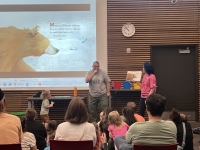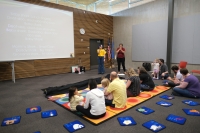All Ages Storytime with ASL Interpretation
Metropolitan Library System
Innovation Synopsis
We provide a monthly all ages storytime with an American Sign Language interpreter. Families with Deaf, hard-of-hearing or children of Deaf adults family members along with hearing families are invited to attend.
Challenge/Opportunity
We were asked to provide an ASL interpreter for a storytime. After talking with the parent, we discovered that there was a whole community of Deaf, Hard-of-Hearing, and CODA families with young children who met regularly in our community. The main issue was that our existing storytimes were not inclusive/accessible for Deaf/ HoH families.
Key Elements of Innovation
Structure & Implementation:
Rather than provide an interpreter for a single child, we co-designed an inclusive storytime with Deaf/HoH families and Oklahoma School for the Deaf.
Program Elements:
- Professional ASL interpretation integrated throughout
- Visual storytelling: books projected on large screen for optimal viewing
- Tactile/vibration activities: shakers, scarves, clapping, stomping in songs
- Traditional elements: books, songs, flannelboards adapted for visual/tactile learning
- Guest ASL storytellers, including OSD Superintendent
- Staff completed ALSC "ASL with Children in Storytime" certification
Key Partner:
Oklahoma School for the Deaf (program planning, guest speakers, community outreach)
Innovation & Unique Elements:
- Shifts from accommodation to community-centered design model
- Creates replicable framework for Deaf-inclusive programming
- Builds library staff cultural competency in Deaf community engagement
Regional impact: families travel up to 100 miles
Achieved Outcomes
Quantitative Metrics:
- Consistent attendance: 15-20 families per session
- Geographic reach: families travel up to 2 hours (100+ miles) to attend
- Program sustainability: 12+ months of programming
- Staff development: 1 librarian completed ALSC ASL certification
Qualitative Impact:
- Families report feeling welcomed at library for first time
- Parents express gratitude for accessible early literacy opportunities for CODA children
- Families demonstrate increased comfort and engagement in library spaces
- Staff confidence serving Deaf/HoH communities significantly improved
New Partnerships:
- Formal collaboration with Oklahoma School for the Deaf
- Guest presenter network within regional Deaf community
Customer Feedback:
- "This is the first library program my family has felt truly included in."
Staff Feedback: Staff at this branch & other locations have increased cultural competency and awareness of accessibility vs. inclusion principles.



